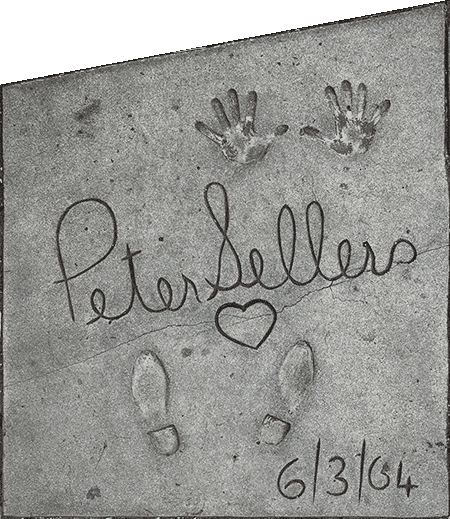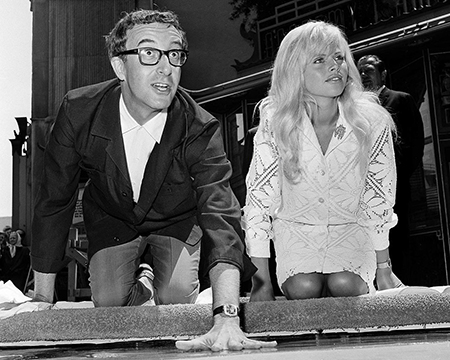 |
 |
|
|
| Peter Sellers |
 |
| Forecourt Ceremony held on Friday, June 3, 1964 |
| |
Born: Richard Henry Sellers, September 8, 1925, in Southsea, Portsmouth, England
Age at the time of the ceremony: 38
Died: July 24, 1980, in London, England, age 54
|
| |
Peter Sellers was one of the leading comic actors in films during the 1960s and 70s. A gifted mimic, Sellers went from goofball to sex-symbol and back again. While his signature role as Dr. Strangelove remains, his recurring role as Inspector Clouseau in the Pink Panther films is undoubtedly his most beloved character. Sellers died tragically young.
Born in the seaside town of Southsea, Sellers' parents were both variety entertainers. Brought on stage at the local vaudeville house at the age of two, Sellers' parents were constantly touring, which caused much unhappiness in young Peter's life. Shy and a loner, he was devoted to his mother Peg.
Moving to London in 1935, the family enrolled Peter in a Catholic school, where he immediately became conflicted, due to his mother's Jewish heritage. Sellers was an indifferent student; talented, but lazy. While his father discouraged Peter from entering showbusiness, his mother encourage him. While at St. Aloysius College, Seller and a friend practiced radio comedy by listening to broadcasts of Monday Night at Eight. Sellers was pulled from the school at the outbreak of World War II, effectively ending Peter's education at age 14.
With the family relocating to Illfracobe Devon, in 1940, Peter was given a job at the Victoria Palace Theatre, managed by his uncle. Starting at the bottom, Peter learned every aspect of theatrical practice. Peter bought a drum kit and spent much time learning to play them.
During the war, Sellers joined the ENSA (Entertainments National Service Organization), performing before troups and factory workers. In September 1943, he joined the Royal Air Force, wanting to become a pilot. His poor eyesight put an end to that idea, but he was folded into the RAF squad's entertainment troup, where he toured to India, Ceylon (Sri Lanka) and Burma (Myanmar). He was a great hit, doing impressions of military types.
He was demobilized in late 1946.
Sellers found working after the war difficult. He eventually had a successful engagement at a sort of burlesque house called the Windmill Theatre in London.
Asking to be auditioned by the BBC, Sellers began making appearences on television and radio in the late 1940s.
Forming a troupe with Spike Milligan and Harry Secombe, Sellers went on to star on The Goon Show aired over BBC Radio from 1951 to 1960. The show, with an audience of up to seven million, has since become a classic of British comedy. The Goons made their first feature film, Penny Points to Paradise (released in May 1951), a quickie filmed in three weeks. It sort of bombed.
Undaunted, the Goons made a short film Let's Go Crazy (released in May 1951), and attempted another feature Down Among the Z Men (released in October 1952), but it too flopped. Sellers was cast in a non-Goon project, Orders Are Orders (released in October 1954), which fared better commercially.
Concentrating on films, Sellers got a supporting role in the Alec Guiness comedy The Ladykillers (released in December 1955), then, after appearing on a few ITV television shows, he was asked to provide the voice of Winston Churchill in The Man Who Never Was (released in March 1956) with Clifton Webb. He then played a 68 year old projectionist in the charming The Smallest Show on Earth (released in April 1957), and co-starred in the comedy The Naked Truth (released in December 1957).
Sellers continued to get supporting roles in films, including Up the Creek (released in May 1958), and the musical fantasy tom thumb (released in December 1958), with Russ Tamblyn. Sellers recorded a comedy album with producer George Martin, which became a hit. Filming for fun on holiday, Sellers and his Goon Show crew made The Running, Jumping & Standing Still Film (released in November 1959), it got released, and which, as producder, became Peter's first Oscar nomination.
Sellers began his habit of multiple roles in The Mouse That Roared (released in July 1959). The British film became a surprise hit in America, while I'm All Right Jack (released in August 1959), became the top-grossing film in Britain that year. He then accepted a role in director Stanley Kubrick's film of Lolita (released in June 1962). Sellers then stepped in for Peter Ustinov for director Blake Edwards in The Pink Panther (released in March 1964). His part as Inspector Clouseau was the highlight of the film, with more to follow.
It was Columbia Pictures who insisted that Stanley Kubrick cast Sellers in multiple roles in Dr. Stangelove or: How I Learned to Stop Worrying and Love the Bomb (released in January 1964). As an RAF Captain, the US President and the titular Dr. Strangelove, Sellers was incredible in each role in a film which retains its impact even today.
When A Shot in the Dark (released in June 1964) started going badly, Blake Edwards was brought in, and he and Sellers turned it into a Pink Panther film. It worked. After meeting and marrying actress Britt Ekland, Sellers suffered several heart attacks. After recovering, he starred in What's New Pussycat? (released in June 1965). He next received a whopping $1 million to appear in Casino Royale (released in April 1967); when he clashed with Orson Welles and walked off the picture, re-writing and another character were invented to cover his incomplete role.
Having divorced Ekland, Sellers filmed The Party (released in April 1968), then I Love You, Alice B. Toklas (released in October 1968), and The Magic Christian (released in December 1969). He scored a hit with There's a Girl in My Soup (released in December 1970) with Goldie Hawn. The first Sellers film to play the Chinese became Where Does It Hurt? (in August 1972).
Despite his troubles, Sellers enjoyed a career boost with The Return of the Pink Panther (released in May 1975). This was followed by The Pink Panther Strikes Again (released in December 1976), but Sellers' physical and emotional problems was making him hard to bankroll. Revenge of the Pink Panther (released in July 1978) was beginning to become threadbare, but the public liked it.
He returned to multiple roles in The Prisoner of Zenda (which played the Chinese in May 1979).
Sellers achieved a lifelong dream in playing Chance the Gardener in a film of the comic novel Being There (released in December 1979). His performance in this remarkable film is a true highlight of Sellers' career.
In London for a reunion dinner with his fellow Goon Show alumni, Sellers suffered a fatal heart attack on the afternoon of July 24, 1980. He was 54 years old. His last film was The Fiendish Plot of Dr. Fu Manchu (released posthumously in August 1980).
|
|
|
|
|
| |
 |
 |
| Grauman's Chinese Theatre, Hollywood, California. Peter Sellers Forecourt block. Executed by John Tartaglia, Friday, June 3, 1964. 40 x 46 inches overall. |
 |
 |
 |
| Grauman's Chinese Theatre, Hollywood, California. Peter Sellers Forecourt ceremony, Friday, June 3, 1964. Sellers and then wife Britt Eckland feel the moment. |
|
 |
| |
 |
| |
|